- Home
- Alan Scholefield
Cat's Eyes Page 2
Cat's Eyes Read online
Page 2
Rachel smiled and held out her hand. “You must be Miss Griffin.”
“Nurse Griffin. How do you do?” She had a deep, mannish voice and her speech was clipped as though she might once have been an army officer.
As they went into the house the telephone rang in Bill’s study. “I’ll get it,” he said.
“It never stops ringing,” Nurse Griffin said disapprovingly. “All day long and half the night.” For a moment Rachel felt that the nurse was the hostess and herself a visitor in her own house. She heard Bill close his study door.
“Where’s Sophie?”
“She’s asleep. I wouldn’t disturb her now, she hasn’t been well. Nothing to worry about, but a nasty cough.”
“Don’t worry. I won’t disturb her.” She went upstairs to the baby’s room.
The curtains were closed and the radiator was on. Sophie lay on her side in the cot and her little face was flushed. She had been put to bed as though she were a doll, blankets tucked up to her chin. She had clearly been struggling to free herself and had almost turned over.
Rachel bent to kiss her. Having spent most of her life in a society which did much of its living out of doors she believed in fresh air as she believed in the sea. She believed in sunshine as a life and health-giving force and whenever possible she put Sophie outside in a pram. She turned off the radiator and opened the window.
Cough or no cough, it seemed better for the child to be cool and comfortable than restless under a load of blankets in an overheated room.
She stood by the cot, willing herself not to pick the baby up and hug her. Suddenly Sophie opened her eyes. Her face puckered as though she was about to cry, then it changed and she smiled. Rachel told herself the child knew her and felt her love almost as a physical force.
There was no need to be careful now. She had pulled back the covers, lifted Sophie and kissed her. “You’re growing more hair!” Sophie put up a hand and gripped her forefinger. She had been almost bald at birth and had had a touch of jaundice. Bill had called her Chairman Mao. Now her hair was growing in spiky tufts. Rachel smoothed them back, then carried her to the window and looked out at the gnarled trees in the paddock. There was a noise behind her and she turned. Nurse Griffin had opened the door.
“Mrs. Chater, the child should not be in a draught.”
Rachel controlled her irritation. “I can look after her.”
The woman started to speak, then tightened her mouth.
“I’ll put her down when she wants to go down,” Rachel said. “Is Mrs. Aske still here?” Mrs. Aske was the cleaning woman, who came in for three hours every morning.
“She has left.” The tone was chilly.
“Left? You mean she doesn’t come at all?”
“Her husband has taken a job in Bristol.”
“I didn’t know ...”
“Mr. Chater did not want to worry you.”
“When did she leave?”
“Three days ago.”
“So you’ve been holding the fort by yourself?”
“I have.” She closed the door and left mother and child together.
“Wow! That was frosty!” Rachel whispered in Sophie’s ear. “Come on, let’s go see your father.”
*
Neither Rachel nor Bill knew that the cat had watched the car as it disappeared down the side of the hill, then it had come out of the safety of the hedgerow and moved cautiously along the side of the road, keeping to the tall grass and the cow parsley. Nor had they noticed that the cat limped. Its left back leg had been damaged in the same accident that had caused the injury to Rachel’s leg and the death of Charlie Leech. But whereas Charlie was long past caring about what damage the accident had done to him, and Rachel Chater knew that her life would go on much as it had before, the injury to the cat had been ruinous. One of the car’s wheels had crushed its left back paw. It could only spring with the power of one leg and this was a severe handicap to its hunting ability.
There was a difference between it and other cats. It was no pet, but a domestic cat that had gone wild; a feral cat.
For days it had tried to capture its usual food of rats, mice, voles, rabbits and birds, but they were now too quick for it, and in the period immediately after the accident it had nearly starved to death.
But it was a survivor and soon learned to fight the crows for the dead squirrels and the mashed rabbits who themselves were victims of road accidents. Sometimes the crows got there first and sometimes there were no bodies lying on the black asphalt in the morning to tell of the night’s carnage. On those days, the cat went hungry.
*
Bill broke his news to her after lunch, when they were in the garden hut where he did most of his work. It was not much more than a shed containing a desk, reference books, typewriter, a large easy chair and a divan. Sophie was asleep in her room, Nurse Griffin was in the house and, for the first time, Rachel felt she could relax and enjoy being home. She lay on the divan, propped up against the cushions, resting her leg. Bill was in his office swivel chair, turning slowly from side to side. He was dressed in jeans, a plaid shirt and moccasins. The informal clothes suited him, she thought. Looking at him with fresh eyes after being away, she registered once more what an attractive face he had, the eyes filled with humour and warmth. He was a good-looking man, there was no doubt about that. She had only to watch the reactions of other women when he walked into a crowded room. He was nearly forty, but looked younger although, as she studied him, she saw that there were new lines and his eyes looked tired. He had seemed to be preoccupied ever since they had reached home, and she felt an inexplicable pang of apprehension.
“Bill, what’s wrong?” she said suddenly.
He made no attempt to prevaricate. Looking at her directly, he said: “I have to go to Hollywood for at least six weeks.”
She stared at him in silence for a moment. “When?”
“On the twentieth.”
“But that’s in two days!”
“I’m afraid so.”
“Oh, God, Bill! Why?”
“Darling, it couldn’t have come at a worse time, but there hasn’t been a damn thing I could do about it. I tried to put it off. I told them you were just out of hospital, but you know what they’re like. They’ve made up their minds and nothing will change them.”
“But what’s it all about? And why didn’t you tell me before?”
“Nothing was certain. I thought it might all fall through. It started about three days after your accident. Maxwell phoned me from the West Coast ...” Maxwell was his Hollywood literary agent. “He said that Franco Talini ...”
“Who’s he?”
“One of the new crop of young Italian producers. Maxwell said he was planning a remake of Trilby. He was putting together a package and wanted me to do the screen-play.”
“Trilby? It’s deadly. Have you read it?”
“Not for years.”
“So what did you say?”
“I said I was interested. Then, typical bloody Hollywood, they started buggering me around. One minute it was on and the next it was off, he was trying to find backing, he’d found backing, he hadn’t found backing. They’ve been on the phone a dozen times in the past week alone. Then last night Max called and said it was fixed. The contract is ready, but they want me at once or it’s all off.”
“What about your book? And the play you wanted to write?”
“I can’t afford not to take this job.” He hesitated. “I didn’t want to go into this quite so soon, but I’ve got next year’s tax assessment. We’re damn nearly broke. That’s why I need the screen-play.”
“What about the American paperback deal on Bird of Paradise?” It was his latest novel.
“It fell through the day after you went into hospital.” He smiled at her without amusement. “One way and another, it’s been a fairly eventful few weeks.”
“Someone else will take it.”
He shrugged. “I can’t count on a maybe. I have a wife and child to keep.
I hate leaving you, my love, especially now, but I promise you I won’t be away a moment longer than I have to.”
“Can’t Sophie and I come too?” Even as she said it she knew it was impossible. She was in no condition to travel, especially with a small baby.
He was shaking his head regretfully. “Apart from your leg and the money it would involve I’m going to have to work closely with Talini. Max said he wants us to go to a cabin in the mountains someone’s lent him so there will be no interruptions.”
Tears were threatening to rise into her eyes, but she managed to control them and smiled at him. There was hardly a tremor in her voice as she said: “Lucky you! Well, Sophie and I will have to find our own amusements. I’ll be able to catch up on the typing, anyway. Have you much of the book for me?”
Was it her imagination, or did his eyes slide away from hers as he shook his head?
“Not this time,” he said. “I’m taking the manuscript with me. New system: I want you to come at it fresh when it’s finished. I’ll have it typed in Los Angeles, then bring back the finished copy.”
“How much have you done?”
“Nearly eighty pages.”
“Hey, you’ve been working! You hadn’t even started it when I went into hospital.”
“All day and half the night, without you to distract me. Not that I wouldn’t rather be distracted. But the sooner it’s finished, the sooner we get the advance.”
She knew now what had caused the deep lines around his eyes and the papery look of his skin. Her heart went out to him. He was a strange mixture: on the surface he appeared confident, easy-going, relaxed. Underneath he was gentle and anxious and worried and conscientious, and the signs of strain were beginning to show. But that was a hazard of his type of work, never knowing from one year to the next how much he was going to earn — or how little. And before they even started to live he had to pay a regular amount into a bank account for his first wife, Sally, who had disappeared from his life long before Rachel had met him.
“At least tell me what it’s about,” she said.
Again he shook his head, again she caught a curiously uncomfortable movement of his eyes. “It’s going to be a surprise. I really do want your unbiased opinion on this one.”
She knew that her most valuable function in his work was her ability to read a completed manuscript with a trained eye and not only give her opinion as a reader, but as a professional who was involved in the writing business herself.
“Okay. It’ll be something else to look forward to when you come back,” she said. “Will you have a chance to do any work on it while you’re in L.A.?”
“I hope so, between sessions with Talini. I’m using this ...”
He picked up a battery-operated, hand-held dictating machine from the desk. “It wasn’t easy to dictate at first, but I’ve been getting better at it and I’ve done nearly twenty thousand words in less than a week. Some of it has already been typed at an agency in Chichester. Those are the tapes.” He pointed to a small pile of cassettes on a shelf.
He showed her how it worked, the start-and-stop button, the rewind of the tiny tape cassette that fitted snugly into the side. “I can lie down or walk around. I can dictate anywhere.”
He was fiddling with the machine, flicking it on and off, and she had the impression that he would like to get back to work.
She eased herself off the divan. By the time she limped past the window he was already hunched over his desk, the dictating machine in his hand, lips moving.
She looked in on Sophie. Nurse Griffin had been there before her, for the baby was tucked in as she had been before. Again she had been struggling and had half-twisted over on to her stomach. Rachel loosened the blankets and eased her on to her back.
That night she had the dream again: First the tapping at the window, then the face, rain pouring down it, mixing with the blood, dark holes where the eyes should have been. But this time it was not a man’s face. She tried to see through the condensation on the inside of the window pane, then she wiped it away with her hand and saw that it was Sophie’s face, etched by the black night, with blood running down her forehead. Sophie’s face, red and puckered and screaming. She heard the scream through the glass of the window, in spite of the noise of the storm.
She wakened, terrified, but Bill was beside her, and he turned and took her into his arms and soothed her, and supported her into Sophie’s room, where she could see for herself that the baby was sleeping peacefully.
The next two days were filled with his preparations for leaving, and she made herself keep on the move so she would have less time to think about the empty weeks which stretched ahead.
She was still weakened by the shock and injuries of the crash, so at night she collapsed early into bed and slept heavily, gaining security from his presence. She found that she could push away memories of the accident and had become adept at forcing her thoughts into other channels — her increasing irritation with Nurse Griffin, for instance; redecoration of the house as soon as money should become available; plans for keeping herself occupied while Bill was away. She would have time to write. She had not written anything since Sophie’s birth, but the fiction editors of two magazines in the States, whom she knew well, had asked several times for stories. She might even earn enough to take Sophie to California to join Bill for a week or so towards the end of his stay. Her leg must be better by then.
When she told him this, he put his arm around her shoulders and said, “Why not? Only I hope I’ll be back in less time than it will take you to finish a story.”
“It would be fun, though,” she said dreamily. “We could take a week off together, drive up the coast road and stay at San Simeon and Carmel.”
“A second honeymoon?”
“... and go on to the Napa Valley and Tahoe and maybe into Oregon. You’ve always said you wanted to go to Oregon.”
“Not in winter.”
“Somewhere else then. I’m going to work so hard I won’t even have time to miss you.”
The day before he left, she offered to pack for him, but he preferred to do it himself, and their bedroom furniture was invisible under piles of clothes as he sorted and folded with brisk efficiency.
She heard Sophie cry. When she opened the bedroom door Nurse Griffin was on her way along the corridor. “It’s all right, I’ll see to her,” Rachel said.
“You should rest your leg.” There was an exasperating hint of reprimand.
“I was told to exercise it.” She felt the angry glare of the thyroid eyes on her back as she went into her child’s room.
It was nearly five o’clock and the evening was clear, with a pale sun. She decided to take the baby for a walk in her pram, and wheeled her around the garden and on to the gravel path. Her leg was aching, but she tried not to limp. They went along the paddock fence at the back of the house and she thought again that the apple trees needed to come down. She would ask Charlie ... she felt her mind try to wrench away, but she brought herself under control. Charlie was not here any longer to cut up firewood and do the other odd jobs. Charlie was dead. Charlie had been killed in her car.
At the end of the drive she saw something on the gate and remembered the welcome-home sign Bill had put up. It was time to take it down, and she thought she would put it away until he was due home.
But someone had added to it, scribbling two words in sprawling black writing so it now read: ‘Welcome home, you bitch.’ She tore it down and crumpled it. Who would do a thing like that? she thought. Kids? It had to be one of the local kids, cruel, casual, unthinking. I’ll tell Bill about it. Then she thought, no, I won’t, it might worry him. She wheeled the pram back to the house. The sun had gone and a cold wind was blowing the first of the autumn leaves across the gravel.
She did not see the dark animal shape that crouched, motionless under the rhododendron bushes, watching her.
*
Later that night, less than half a mile away, on the edge of Lexton Hanger, the
cat went hunting. Earlier it had stalked a rabbit that had come out from the edge of the forest and was feeding at the top end of the Chaters’ paddock. It had been a long and exhausting stalk, for the rabbit had been nervous, sensing danger. The result was that it had fed in little bursts, moving quickly from place to place. Three times the cat had reached springing distance; three times the rabbit had hopped away. Finally, the cat had approached to within a few feet and lain behind the rotting stump of an old apple tree. This time the rabbit had not moved. The cat had crouched closer to the ground. Suddenly, like an uncoiling spring, its body had shot forward. There was a moment of blinding pain in its rear paw. The pain had come up into its throat in a half-expressed cry. It was enough for the rabbit. The sound had given it a split-second’s warning and it had whisked away to one side and then raced for its burrow on the edge of the hanger. The cat had stood where the rabbit had been, its tail flicking angrily from side to side. It was starving. It had had nothing to eat all day.
With all senses alert, it came through the long grass of the paddock towards the dark house. Where the paddock gave way to lawn it paused, crouching in the shadow of a rhododendron bush; it watched and tested the air with its nose. It had lived in the wild now for nearly six years and the reason it had stayed alive was because it was cautious.
An owl hooted, but there was no other sound. Again, moving softly as a blown leaf, the cat approached the house. There was a smell of water and it was thirsty. It came to the swimming-pool and crouched, straining its neck until it was able to lap. Just then it saw a movement at one end of the pool, a young rabbit being chased by a weasel. It raced along the grass and then, unable to stop, fell into the water. The weasel stopped, saw the cat and disappeared into the night. The rabbit was moving in circles, trying to get out, but the overhang of the coping-stones made this impossible. The cat watched its struggles and then, as it came to the edge for the second time, scooped it out with its paw and bit it at the base of the skull. The rabbit gave a single piercing scream. The cat carried it into the shadow of the rhododendron bush where it ripped the warm body apart.
Rachel heard the scream. This one was not in her dream, but real. What was out there? Rabbits screamed as they died. She had heard one before on a summer night and Bill had told her what it was. But that sound had been far away. This was close to the house.

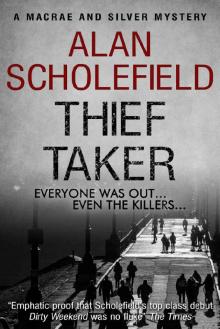 Thief Taker (A Macrae and Silver Mystery Book 3)
Thief Taker (A Macrae and Silver Mystery Book 3)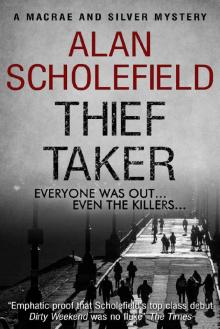 Thief Taker
Thief Taker Threats and Menaces
Threats and Menaces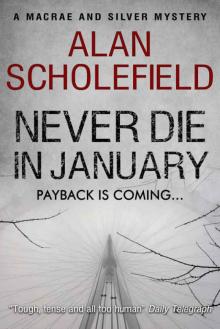 Never Die in January
Never Die in January Venom
Venom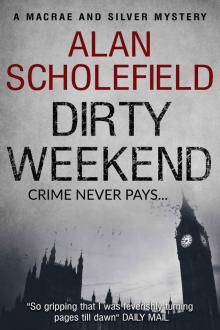 Dirty Weekend (Macrae and Silver Book 1)
Dirty Weekend (Macrae and Silver Book 1)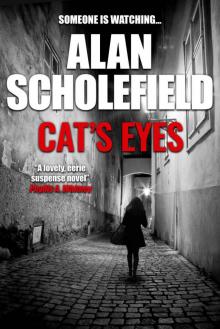 Cat's Eyes
Cat's Eyes Berlin Blind
Berlin Blind The Sea Cave
The Sea Cave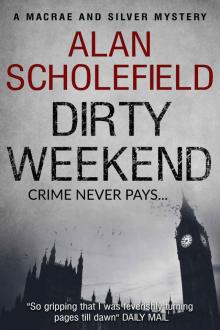 Dirty Weekend
Dirty Weekend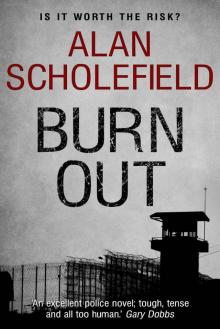 Burn Out (Dr. Anne Vernon Book 1)
Burn Out (Dr. Anne Vernon Book 1)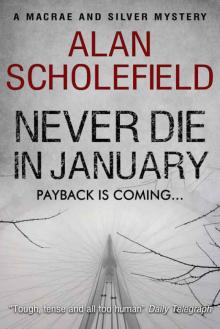 Never Die in January (A Macrae and Silver Mystery Book 2)
Never Die in January (A Macrae and Silver Mystery Book 2)